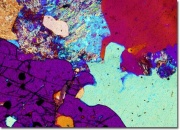Difference between revisions of "Sillimanite"
Jump to navigation
Jump to search
| Line 3: | Line 3: | ||
A fibrous or prismatic aluminum silicate mineral. Sillimanite was named in honor of Benjamin Silliman, a professor of mineralogy at Yale. It was previously called fibrolite. Sillimanite is found in South Africa, India, Germany (Bavaria), France, the Czech Republic, Scotland, United States (California, New York, Pennsylvania, South Carolina, Delaware, Connecticut, Massachusetts) and southeast Asia. Its color is usually a brown or gray, but stones found in southeast Asia are a gem quality sapphire blue. Sillimanite is a refractory material with high heat resistant. It is used for kiln brick, spark plugs, and laboratory items. | A fibrous or prismatic aluminum silicate mineral. Sillimanite was named in honor of Benjamin Silliman, a professor of mineralogy at Yale. It was previously called fibrolite. Sillimanite is found in South Africa, India, Germany (Bavaria), France, the Czech Republic, Scotland, United States (California, New York, Pennsylvania, South Carolina, Delaware, Connecticut, Massachusetts) and southeast Asia. Its color is usually a brown or gray, but stones found in southeast Asia are a gem quality sapphire blue. Sillimanite is a refractory material with high heat resistant. It is used for kiln brick, spark plugs, and laboratory items. | ||
| − | + | [[File:Sillimanite gemstone with organic bands.PNG|thumb|FTIR (MFA)]] | |
== Synonyms and Related Terms == | == Synonyms and Related Terms == | ||
fibrolite; aluminum silicate; bucholzite; Sillimanit (Deut.); | fibrolite; aluminum silicate; bucholzite; Sillimanit (Deut.); | ||
| − | == | + | ==Physical and Chemical Properties== |
| − | Orthorhombic crystal system; usually occurs as fibrous mass. Perfect cleavage in one direction. | + | * Orthorhombic crystal system; usually occurs as fibrous mass. |
| − | + | * Perfect cleavage in one direction. | |
| − | Fracture = uneven or splintery. Luster=vitreous. Streak = colorless. | + | * Fracture = uneven or splintery. |
| + | * Luster=vitreous. | ||
| + | * Streak = colorless. | ||
{| class="wikitable" | {| class="wikitable" | ||
| Line 23: | Line 25: | ||
|- | |- | ||
! scope="row"| Melting Point | ! scope="row"| Melting Point | ||
| − | | 1900 | + | | 1900 C |
|- | |- | ||
! scope="row"| Density | ! scope="row"| Density | ||
| − | | 3.23-3.24 | + | | 3.23-3.24 g/ml |
|- | |- | ||
! scope="row"| Refractive Index | ! scope="row"| Refractive Index | ||
| Line 32: | Line 34: | ||
|} | |} | ||
| − | == | + | ==Resources and Citations== |
| − | |||
| − | |||
| − | |||
| − | |||
| − | |||
| − | |||
| − | |||
| − | |||
| − | |||
| − | |||
| − | + | * Mineralogy Database: [http://www.webmineral.com/data/Sillimanite.shtml Sillimanite] | |
* Robert Fournier, ''Illustrated Dictionary of Practical Pottery'', Chilton Book Company, Radnor, PA, 1992 | * Robert Fournier, ''Illustrated Dictionary of Practical Pottery'', Chilton Book Company, Radnor, PA, 1992 | ||
| Line 50: | Line 42: | ||
* ''Van Nostrand's Scientific Encyclopedia'', Douglas M. Considine (ed.), Van Nostrand Reinhold, New York, 1976 | * ''Van Nostrand's Scientific Encyclopedia'', Douglas M. Considine (ed.), Van Nostrand Reinhold, New York, 1976 | ||
| − | * ''Encyclopedia Britannica'', http://www.britannica.com Comment: "Sillimanite." | + | * ''Encyclopedia Britannica'', http://www.britannica.com Comment: "Sillimanite." Accessed 18 Aug. 2004. |
* C.W.Chesterman, K.E.Lowe, ''Audubon Society Field Guide to North American Rocks and Minerals'', Alfred A. Knopf, New York, 1979 | * C.W.Chesterman, K.E.Lowe, ''Audubon Society Field Guide to North American Rocks and Minerals'', Alfred A. Knopf, New York, 1979 | ||
| − | * Wikipedia | + | * Wikipedia: http://en.wikipedia.org/wiki/Sillimanite (Accessed Nov. 9, 2005) |
[[Category:Materials database]] | [[Category:Materials database]] | ||
Revision as of 08:58, 31 May 2022
Description
A fibrous or prismatic aluminum silicate mineral. Sillimanite was named in honor of Benjamin Silliman, a professor of mineralogy at Yale. It was previously called fibrolite. Sillimanite is found in South Africa, India, Germany (Bavaria), France, the Czech Republic, Scotland, United States (California, New York, Pennsylvania, South Carolina, Delaware, Connecticut, Massachusetts) and southeast Asia. Its color is usually a brown or gray, but stones found in southeast Asia are a gem quality sapphire blue. Sillimanite is a refractory material with high heat resistant. It is used for kiln brick, spark plugs, and laboratory items.
Synonyms and Related Terms
fibrolite; aluminum silicate; bucholzite; Sillimanit (Deut.);
Physical and Chemical Properties
- Orthorhombic crystal system; usually occurs as fibrous mass.
- Perfect cleavage in one direction.
- Fracture = uneven or splintery.
- Luster=vitreous.
- Streak = colorless.
| Composition | Al2SiO5 |
|---|---|
| Mohs Hardness | 6.0 - 7.5 |
| Melting Point | 1900 C |
| Density | 3.23-3.24 g/ml |
| Refractive Index | 1.65; 1.66; 1.68 |
Resources and Citations
- Mineralogy Database: Sillimanite
- Robert Fournier, Illustrated Dictionary of Practical Pottery, Chilton Book Company, Radnor, PA, 1992
- Van Nostrand's Scientific Encyclopedia, Douglas M. Considine (ed.), Van Nostrand Reinhold, New York, 1976
- Encyclopedia Britannica, http://www.britannica.com Comment: "Sillimanite." Accessed 18 Aug. 2004.
- C.W.Chesterman, K.E.Lowe, Audubon Society Field Guide to North American Rocks and Minerals, Alfred A. Knopf, New York, 1979
- Wikipedia: http://en.wikipedia.org/wiki/Sillimanite (Accessed Nov. 9, 2005)

